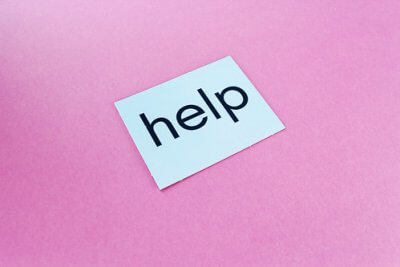Reaching Out Hard? 12 Keys to Getting Support
by Andrea M. Darcy
Read advice that tells you that if you feel low, just ‘reach out’? But attempts you have made (if any) have gone poorly and left you feeling bad?
Reaching out is a skill that not all of us learned as a child or were encouraged to do. On a good note, skills are things we can learn.
So how can you more easily and effectively reach out for support?
[Need support immediately and nobody to talk to? See the NHS list of free and confidential helplines in the UK here].
Preparing yourself to be a person who accepts support
1. Recognise the beliefs you have about support.
If we feel ashamed or afraid to ask for support, it means we have unhealthy hidden beliefs about it. These can look like:
- only weak /stupid people ask for help
- it’s not ‘manly’ to ask, or makes you ‘needy’
- You aren’t worthy of help
- people only let you down.
Let yourself journal about support. What comes up? For each of the beliefs you find you have ask yourself, is this really true? What might be true instead?
2. Find proof you DO know how to ask for help.

By: Rory MacLeod
If we are counterdependent, we can convince ourselves we never ask for help. We aren’t the type.
But at some point we’ve all received support. And recognising your past successes is a way to change your perspective about your own talent to do so.
Make a list of any situation where you accepted help, from little things like letting someone drive you somewhere, to bigger things, like a relative who gave you money for school.
3. Learn to recognise the RIGHT people to reach out to.
If you had had very bad luck in the past, it might be that you have a tendency to self sabotage.
This looks like asking the very people who are most likely to let you down for help, instead of the ones who would be happy to listen or care.
Think of all the people you know. Who shares your values? And who is known for helping others, or being trustworthy? Has anyone been a good listener already? Who should quite honestly be crossed of the list for good?
4. Know what you actually want.
If we aren’t the sort who knows our thoughts or feelings, or how to ask for things? We can call someone, and end up waffling or changing subject, or even asking for what we DON’T want (we want to be listened to only, but go and ask for advice).
Afterwards we feel letdown. And we blame the other person. How could they not see what we need? Or understand us? We promise never to ask for help again. We don’t want to see that we are the one who has to make our needs clear, and ask for what we want.
If there was a genie who would never judge you, and you could ask for anything, what would it be?
- To be listened to?
- To just pass the time and feel less lonely?
- Someone to make you laugh?
- Or do you need some attention, or even praise?
- Do you want to admit the crazy thoughts in your head?
- Someone to listen to you rant and not interrupt or judge?
5. Challenge the idea that you are always rejected.
People are actually more likely to help than not. A study from Stanford University published in the Journal of Personality and Social Psychology found that people “underestimated by as much as 50% the likelihood that others would agree to a direct request for help”.
If we always get rejected by others, it can be because we are actually unconsciously pushing people to reject us. And it’s about learning to ask in a calm, open way instead of:
- asking for help in a hostile, bossy way
- prefacing our ask with negativity, such as, “I’m sure you don’t want to help, but…”
- blaming them in our request “you never want to listen, but I need support”.
Or, again, it could be that we always ask the wrong people. And are surrounding ourselves with people who aren’t really ‘friends’ at all.
[Is this point hitting home? Go read our article, “Why Rejection Keeps Happening to You“.]
The day you are reaching out
1. Be sure this is the right time for you.
Feeling so incredibly fragile not sure you can handle a single piece of well-intentioned advice? If it’s going to make you feel worse not better, it’s okay to delay and decision to reach out.
2. Get emotions out first.

By: mario
When we are full of rage or crying our eyes out, it’s hard for people to hear what we are asking for.
Or, worse, we can inadvertently turn our emotions on them, and end up upsetting the very person we want to connect with.
Journal, punch a pillow, rant out loud, go for a long, hard run… whatever works to help you feel neutral and calm. Make that call when you feel a five out of ten or less on the emotional volatility scale.
[**note that if you feel suicidal, or like you will hurt yourself or someone else, none of this applies. Reach out for help immediately. Call emergency services, a help line, or someone you trust.]
3. If you feel afraid or nervous, keep going.
No matter how much you’ve prepared, if reaching out for support is new for you, you are going to feel uncomfortable and even afraid. And that’s okay.
It’s like the famous book by Susan Jeffers says… ‘feel the fear and do it anyway”. Or the embarrassment, or shame, or whatever it is.
4. Ask first.
If in the past reaching out for support has gone wrong, leaving you feeling rejected? It might be that you surprised someone at a bad time.
There is some wisdom to sending a text or email first. “Are you around to chat? I don’t need advice, I just need someone to hold the space as I rant about a bad experience I had this week. I’d really appreciate it.”
5. Don’t take it personally if someone says no.
People have lives. They might have had an emergency, or actually be busy like they said. Just ask when is a good time.
If they say they can’t be of assistance at this time, remember that they might be having their own difficulties at the moment. It probably isn’t personal.
6. Communicate as clearly as possible.

By: Stock Catalog
Breathe, take your time.
If words aren’t coming out right, just be honest that it’s hard for you to ask for support. “Bear with me, reaching out for help is new for me.”
Then continue slowly, keeping sentences starting with ‘I’ (I feel/I want) and not veering into ‘you’ (are you really listening? You don’t really want to help, do you…). Note that the latter is blame, and it’s the easiest way to push someone away.
7. Be grateful.
Giving and receiving are two sides of the same coin. The other person gets to feel useful, to feel connected, to share advice. So you don’t have to end the conversation feeling embarrassed. Just say thank you, and offer your support in kind should they need it.
When in doubt, start with a stranger.
If you really can’t ask for support from someone you know, then don’t. There is nothing wrong with asking for help from strangers.
This can be a forum, although asking for help from others who are feeling unstable themselves isn’t always the best case scenario.
So better yet consider a help line. A trained volunteer who is happy to listen and is unbiased can be a great support (read our list of help lines in the UK).
Try, try again.
What if it doesn’t work out? Yes, it will feel bad. You might feel rejected and hopeless.
But it’s no proof of anything other than that you had a moment of bad luck, or caught someone at an unforeseen bad moment.
So let the thoughts that you are ‘beyond help’ or ‘nobody cares’ dance through your head all they want. Do not let it stop you from trying again.
Want support from someone who is unbiased, doesn’t judge, and really ‘gets it’? Book a session with a top London therapist now. Or use our booking platform to find affordable online registered therapists.
 Andrea M. Darcy is a mental health and wellbeing writer and expert. She is also extremely independent has always found asking for support a struggle! Find her @am_darcy
Andrea M. Darcy is a mental health and wellbeing writer and expert. She is also extremely independent has always found asking for support a struggle! Find her @am_darcy





